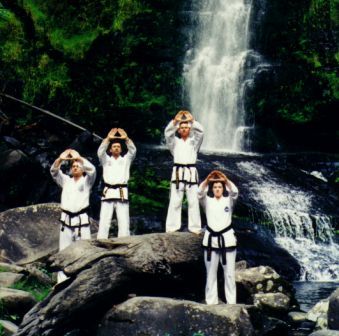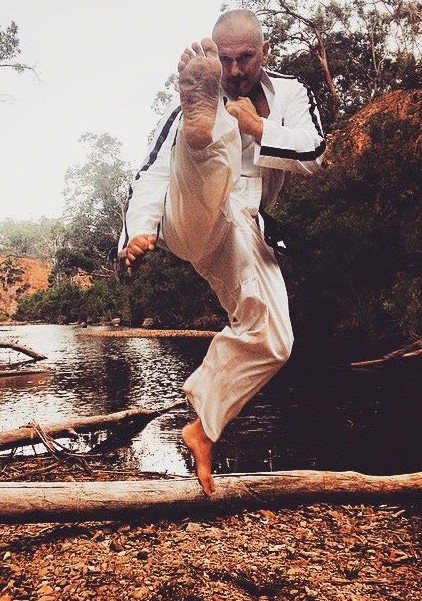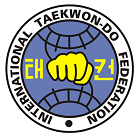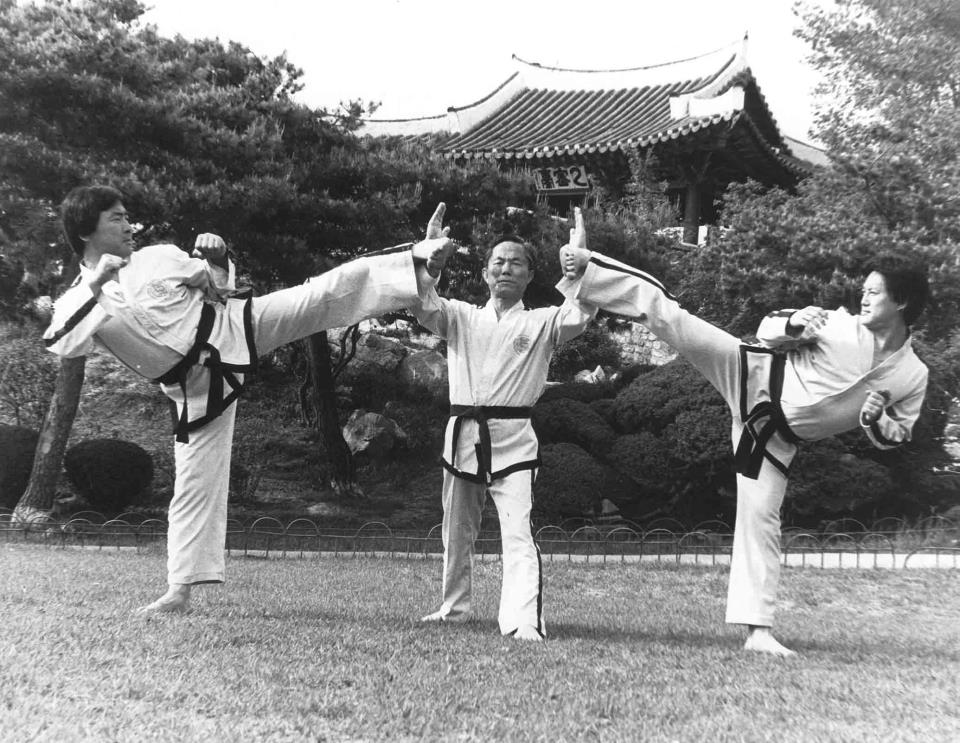Ethics in Martial Arts
By Michael Muleta, 8th Degree – ITF Under Secretary

When we talk about a good martial artist having high ethics, or displaying ethical behaviour, what do we mean?
Ethics can be described as a high level of socially conscious behavior which embodies the spirit of martial arts. It involves the ability of a martial artist to incorporate their body and mind, not just in their ability to focus on a technique, but also to guide their everyday actions and judgement.
It is the manner in which one behaves righteously in both word and action.
Ethics should be an integral part of the theory and philiosophical study of any martial art, setting the moral guidelines for all practitioners of that art, from the beginning students to the Grandmaster.
Ethics and ethical principles stem from the traditional and cultural elements of a martial art, whilst taking into account modern society and its laws. Of major importance is the concept of nonviolence, respect and courtesy for others, loyalty to one’s family, friends and country, and the tolerance of those who have differing ideologies.
Many instructors constantly preach ethics to their students, when often the best way to transfer these values is when the student can observe it in their own instructor’s deeds.
Making students memorize the tenets of taekwon-do or a student oath for the purpose of ceremony or testing does little for their development of these social principles if they are not demonstrated by example.
Ethical behaviour and principles cannot be forced upon someone in a short time; good ethics must be cultivated with leadership bringing about a long-term change in thinking and lifestyle.
A proficient exponent of martial arts should not only be a superior athlete, highly competent in combat, but also an upstanding citizen of their community, with high moral and social virtues. It should be the goal of any instructors to develop not only great practitioners and ambassadors of their particular style, but also people of high upstanding character.
The ability to kick, punch, sweep, throw, use weapons are all forms of combat, involving physical skills which do not necessarily require one to be a martial artist in order to perform. Naturally however, a well-trained exponent will perform them better, if taught effectively, you would expect.
Most martial arts organizations have their school rules, or a Code of Conduct, which provide behavioural guidelines and expectations of its members. But what about the instructors and the more senior ranks within those organizations, who often create these rules, what guides them?
As an instructor, the easiest thing to teach are the physical aspects of the art, as most good instructors can perform and students can imitate. It is much more challenging to be able to provide students with a living model of high ethics and upstanding integrity, both inside and outside the dojang, over a long period of time.
Instructors as Role Models
Students look up to their Masters and instructors, as people supposedly having achieved a level of higher consciousness and morality. They are seen as people of high discipline and skill, striving for peace and love for themselves and others, people of superior intellect, wisdom and foresight.
It is with this in mind that senior instructors and masters need to be aware of their social responsibilities and profound influence they can have on their following of students, who often mirror their behaviour and attitudes, in a quest to be like them.
This can be a great quality if the Master displays all those qualities mentioned, but can also be potentially disastrous should the instructor display many of society’s lesser qualities and fall victim to its many vices.
Key ethical qualities
Many martial arts have adopted their Ethical Codes from ancient societies. Most ancient Codes base their teachings on humility, honesty, bravery, compassion, sincerity, loyalty and devotion to our families, friends, and country.
Humility
Humility does not come easily for most martial artists, and can somewhat be lost with the proliferation of “sport” aspects of martial arts coming to the fore.
Humility can be a combination of not boasting about one’s own abilities, whilst at the same time not heaping criticism on the abilities, or perceived lack of it, of others.
It is important that a skilled martial artist does note become too vain or self-indulgent in respect of their achievements or successes in the competition arena, the size of their school or organization, or constantly brag about victories they have had in the heat of battle, in or out of the ring.
“The superior man is always dignified, but not proud; the inferior man is proud, but not dignified.” (Confucius)
In most cases, a lack of humility also results in a lack of willingness or ability to be taught any thing new. Martial artists with low levels of humility tend to think they know it all already. Humility is a prerequisite for learning.
Often martial artists from different styles will vehemently criticize those who practice other art forms, or are members of a different organization practicing the same art, showing little appreciation that the Martial art is only the vehicle used to travel on the same journey of enlightenment.
Rather, these people should appreciate that every martial arts has its quality people who have spent many years and effort in accomplishing their level of ability and being.
It’s not the style that is necessarily better or worse, it is in most cases, the stylist.
Respect
Respect in martial arts often is emphasized towards those who are senior to us, and those who teach us and lead our organizations, just as we respect our parents. This type of respect is important and forms the basis of etiquette in all styles.
Unless this respect is present, it becomes difficult for the instructor to teach, and almost impossible for the student to learn unconditionally.
Sadly, sometimes this respect is in the form of a forced sense of obligation to respect, rather than a true sense of respect for that persons’ worth, knowledge and personal character.
The instructor, who demands that their students “must” respect them, is one who craves respect, often because they struggle to earn respect on their own merits or in other walks of life.
Just as the bully was once the victim of bullying, forced respect is a trait of the person who grew up gaining and displaying little respect themselves.
An admiration from students for the way one can handle themselves in simulated combat, should not be confused for the respect of a person’s character.
Respect and acceptance of others should extend well beyond the training hall. Respect should be shown within the family unit, towards elders of the society, within your workplace and schools. Respect should be given without the expectation of receiving anything in return. Without forcing the issue, respect tends to be reciprocated to those who display it.
Respect and appreciation for your nation should be paramount, whether you are a native of that country or one of its’ many new inhabitants. An acceptance of its’ diverse cultures attitudes and peoples is necessary for there to be any hope of reducing violence and to restore world peace.
Is this not one of the objectives of a martial artist? We often quote it in some pretty student oath, but how many people actually do anything about it?
(See ‘Respect in Martial Arts‘ article)
Integrity / Honesty
Perhaps the most important aspect of being a true martial artist is to have a high moral character. To be honest in all their dealings and be able to behave according to what is acceptable and right.
They should not allow themselves to be bought by positions of power, corrupted by money, nor weakened by desire and ego.
Too many people in martial arts spend a lot of their time chasing dollars, which is not to begrudge those who are successful by legitimate means; however money should be a byproduct of success and good business planning in martial arts, for those who go down that path, rather than the blatant driving force behind one’s involvement.
Martial arts is littered with people who chase position, promotion and inducements, often groveling at the feet of the highest ranks in their art, in the hope of being treated favourably when it comes time to test, or appoint positions within the organization.
The true martial artist must have enough pride in themselves not to be used and corrupted by others; they should never permit themselves to be manipulated by higher ranks for their own evil and selfish agendas.
Only by doing so, will they always have a clear conscience sense of righteousness.
Courage
Courage is not the absence of fear; it is the ability to achieve one’s goals despite fear. There are different forms of courage. What people often mistake for real courage is the ability to show one’s ability in combat, a willingness to partake in violence or physicality, or the shameless intimidation of others.
Real courage, from a martial arts point of view, should be in terms of the willingness to defend justice and truth, regardless of danger, personal interest or cost. The stand tall in the face of corruption and speak out when wrong is evident, and take proactive steps to rectify the situation, be it at club level, within an organization, within your community or within a nation.
This is a far higher form of courage, than just the want to fight, although if you are in combat, of course the first form of courage is also necessary.
The preparedness to sacrifice is the underlying quality of a true martial artist. No great human achievement can ever be conquered without some personal sacrifice.
Self Control
Martial arts skills should not be used as a means to vent ones frustrations or anger, or to carry out unprovoked attacks on innocent victims. As Martial Arts practitioners, physical confrontation should be avoided whenever possible. The use of force should be condoned only in genuine self-defense or in the defense of those who are defenseless. There is no place for a martial artist who partakes in the unnecessary intimidation of others (usually those smaller or weaker), violent behavior, criminal activities, vanity, any social vices or addictions of prohibited substances or behaviours.
Skills should only be used in defense of one’s fellow human beings against unjust violence, to the point of self-sacrifice, if necessary.
Every person has the right to defend themselves, but restraint should be shown where possible, only using the amount of force necessary to diffuse the situation, causing minimal physical or psychological injury.
In summary, apart from high level physical skills, it is the upholding of high ethics that should set the martial artist apart from the general public.
Instructor Guidelines:
How a good instructor can display good ethics :
- Conduct themselves in a professional and appropriate manner at all times
- Ensure they are adequately skilled, knowledgeable and qualified to teach their art
- Respect the rights, qualities and abilities of each student
- Teach techniques which are legitimate and safe to practice
- Know the limitations of their students and themselves
- Avoid unnecessary physical contact with any student
- Be honest and fair in all dealings with students
- Ensure all services advertised and paid for are actually delivered
- Adopt honest, fair and transparent business practices
- Be consistent towards all students
An instructor should not:
- Award themselves rank promotion, or titles such as Master or Grandmaster without earning them through legitimate channels
- Physically or psychologically take advantage of any vulnerable student, particularly minors
- Display questionable behaviour in presence of students (swearing, smoking, drug taking, overt sexual behaviour, excessively drinking alcohol etc)
- Charge fees or collect money under false pretenses
- Criticize other clubs, instructors, officials or students to their members
- Pass on or use students contact details for personal purposes
- Make claim to achievements that never occurred
- Value only winning above all other things
- Interfere in a student’s personal affairs or outside interests
- Protect the dignity of their students regardless of age, gender, race, ethnicity, religion, sexual orientation, disability or socioeconomic status.
- Pressure a student into engaging into a personal relationship with them.
- Partake in, support or condone criminal behaviour
- Use their class as a platform to promote their own personal beliefs, be they political, religious or of similar nature.
- Award rank to students when it is not earnt on merit
- Approach students or other schools to lure them across to their school
‘Ethics in Martial Arts’ – by Michael Muleta

As published in Australasian Taekwon-Do Magazine.
If you enjoyed this article, check out a similar blog Michael Muleta wrote on ‘Respect in Martial arts‘

